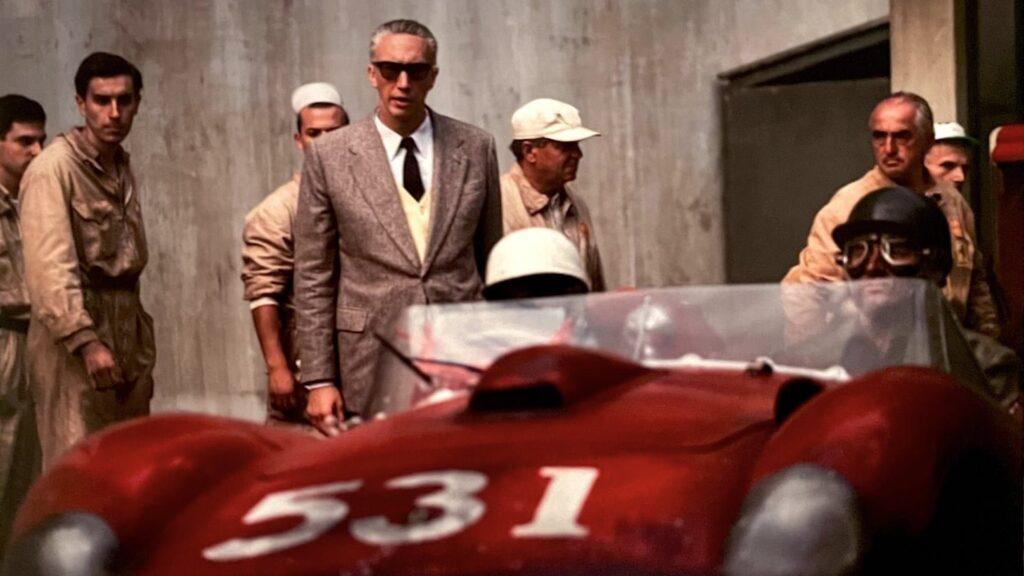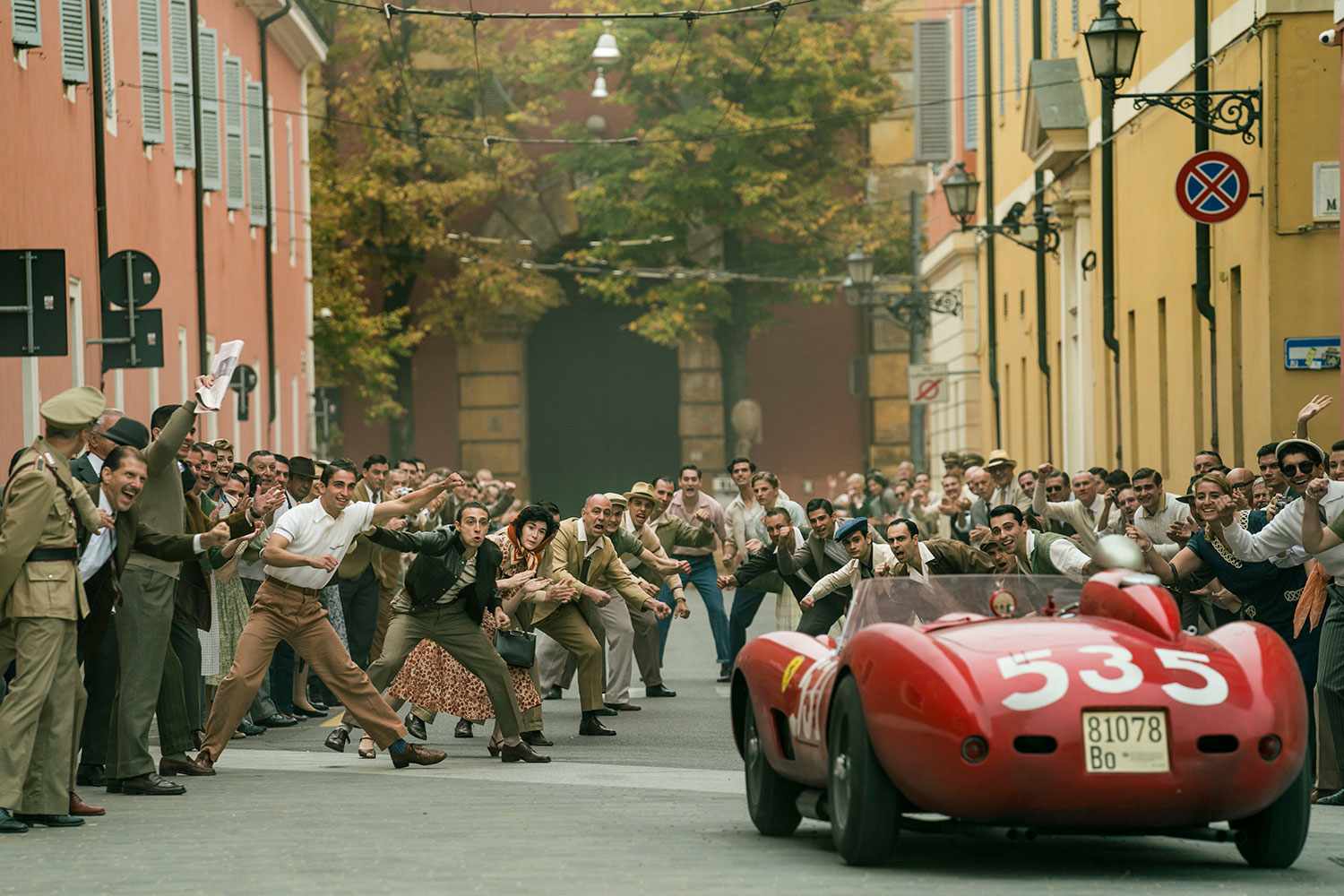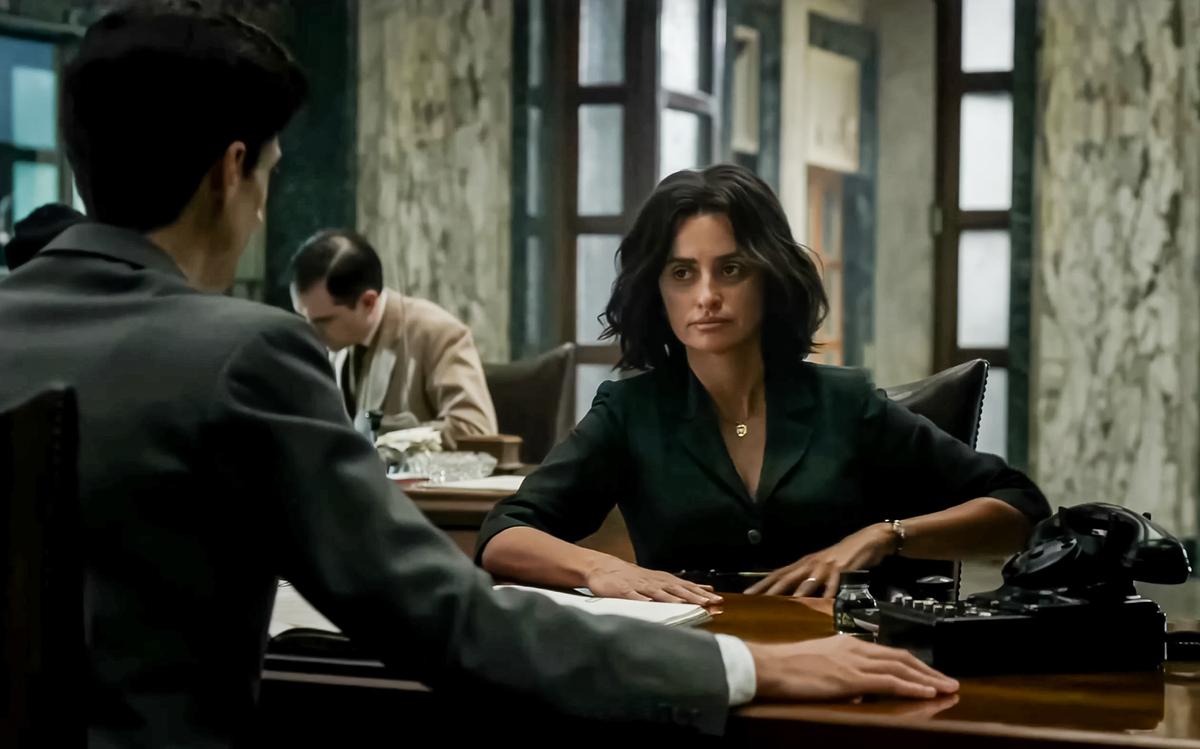Ferrari follows the recent trend of major films providing an aspect of human interest to something we associate most with as an inanimate object. Ferrari captures the excitement and distress of the man who started the most famous racing car brand in the world, although it does take cinematic liberties.
Ferrari may be one of the most recognizable (and desirable) sports car/racing brands in the world today, but it wasn’t always that way. As with all success stories, there was a time when the future of the fledgling dream was very much in doubt. Michael Mann’s latest film details the life of founder Enzo Ferrari during a particular tumultuous time in his life. Instead of telling the story of his entire life, it chooses to condense some of his biggest struggles into a three month period of time.
Ferrari
Directed By: Michael Mann
Written By: Troy Kennedy Martin
Starring: Adam Driver, Penelope Cruz, Shailene WoodleyRelease Date: December 25, 2023
The year is 1957, and both Enzo Ferrari and the company named after him are in a tough spot. On the business side, Ferrari S.p.a. faces increased competition on the racetrack and in the marketplace. The company was not founded to build cars, but instead to race them. Selling street versions of their race cars was only a scheme to raise funds. But in 1957 the company was running out of money because they were unable to sell enough cars. There are two solutions; win races to gain more exposure to increase sales, or seek external investment.
Winning races is easier said than done. With increased competition and limited resources, Ferrari pushes his team to the brink. One of his most dependable drivers dies in a test accident. Enzo himself knows all too well about facing death on the racetrack. He is haunted by the death of two fellow racers and friends from when he himself was a racer in the 1930’s. When his son was born he quit racing forever. Yet, Enzo pushes his team to secure wins at any cost, fully aware he is tempting fate. The press hounds him for culpability, and despite shifting blame he shoulders the load in private.

But Enzo Ferrari’s challenges don’t start and end with racing. His business life has bled into his personal life (and vice versa), which is full of turmoil at this point in time. It is difficult for him to seek outside investment not only because it will mean that he has to give up control of his life’s work, but also because he has split ownership of the company with his wife Laura. His relationship with Laura has become strained, to say the least. A year prior Enzo and Laura experienced the greatest tragedy of all, losing their son Alfredo to a terminal illness.
This loss weighs heavily on both of them, and yet it is made even worse by the fact that Enzo has another son with his mistress whom he has kept as a secret from Laura. Enzo keeps the truth from Laura for fear that she will act out in retribution against him with his treasured company. It is apparent they still love each other, but without being able to trust each other it is impossible for them to be able to work together. With both his personal and professional lives intertwined and balanced on the brink, he has to carefully navigate his way forward.
The resulting film is halfway between biography and sports film. While it strives for authenticity, it does simplify or smooth over some of the actual history to make for a more streamlines presentation. It spends part of its time documenting spine-tingling races of beautiful cars speeding through the breathtaking Italian countryside. The rest of the film puts Enzo under a microscope, watching him attempt to wrangle control of a life that has gotten away from him. Both areas ratchet up the suspense, but for different reasons.

In those racing scenes, the film’s sheer noise and grit is enough to pull the audience to the edge of their seats. It communicates early on just how dangerous racing was before safety was even the faintest consideration. In many ways the drivers were like 20th century gladiators, putting their lives on the line for entertainment and glory. Director Michael Mann didn’t want to make a film that captured only the beauty of the scene. He wanted to put the audience into the cockpit to feel the power of these beautiful beasts, and he succeeded.
I think the film is somewhat less successful when approaching Enzo’s personal life. Adam Driver brings the necessary obsession-fueled haggard demeanor to Enzo, but it is never not strange seeing him try to portray someone who is supposed to be 20 years his senior. It is also kind of difficult not to compare his work here with what he already accomplished recently in a similar role in Gucci. In this film he sports a subdued accent, and of course the film has to portray him in a more positive light in order to get approval to use his image. Penelope Cruz on the other hand is free from these distractions and provides a very powerful performance as Laura. She does a great job of portraying the right combination of anger and love for Enzo that really helps the audience comprehend the difficult position the couple is in.
Regarding the script, the film is neither too specific nor is it detailed enough. Because it essentially splits its time between two areas, both feel like they are slightly incomplete. The racing is exciting, but would feel like it had higher stakes if the film spent more time on the drivers. Enzo’s personal struggles are somewhat limited by the film’s minimal backstory. Those who know the history will see the homages and little easter eggs, but also realize the way the film glosses over some of the messier details. Those who don’t know the history will feel like they get the bare minimum information needed to understand the context of the plot. However, the film’s narrative shortcuts (pun not really intended) don’t necessarily ruin the experience, and are a welcome trade off to giving the audience a broader and more neatly packaged perspective on events.

Plot: Set in the summer of 1957, with Enzo Ferrari’s auto empire in crisis, the ex-racer turned entrepreneur pushes himself and his drivers to the edge as they launch into the Mille Miglia, a treacherous 1,000-mile race across Italy.
Director Michael Mann is known as an auteur filmmaker, and his bespoke approach can be felt with every aspect of Ferrari. The incredibly detailed recreations of the cars and locales were clearly a labor of love and they all look fantastic and authentic. Above all the film expertly captures the style of the era, using cinema from that time as a reference. The clothes, the hair, even the somewhat grainy texture of the cinematography feel right for the time period portrayed. It carries on Mann’s attempt to give the audience a first person perspective of events. Even if we are watching actors recreating the lives of these famous people, the film makes us feel like it transports us back in time.
In this manner, Ferrari achieves most of what it set out to do. It is not always as exciting as the thrilling races that are depicted, and certain creative decisions do distract from the filmmaker’s intent. Yet this film succeeds in painting the complicated picture of the man known as Il Commendatore and the considerable difficulties he faced creating his legacy. It honors the great personal sacrifices that often come with achieving your dreams, and the resolve it takes to be able to carry those burdens for the rest of your life.

